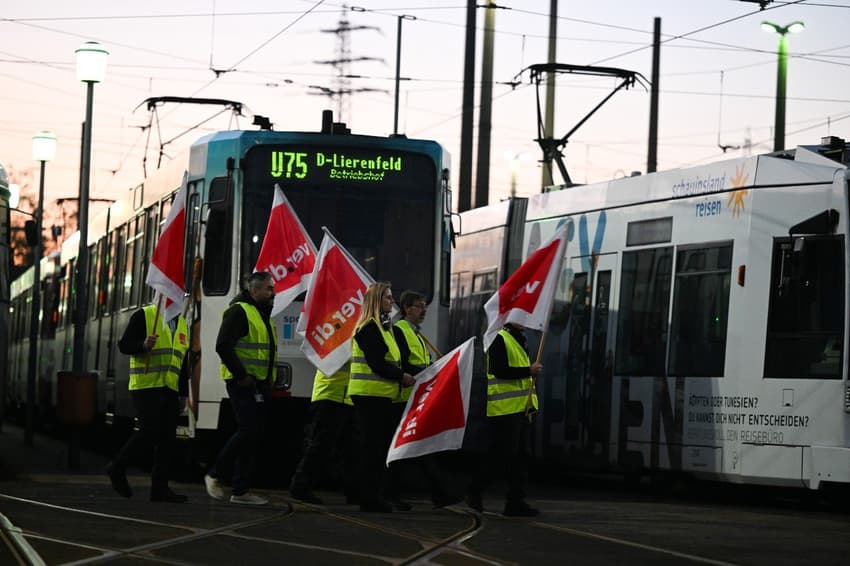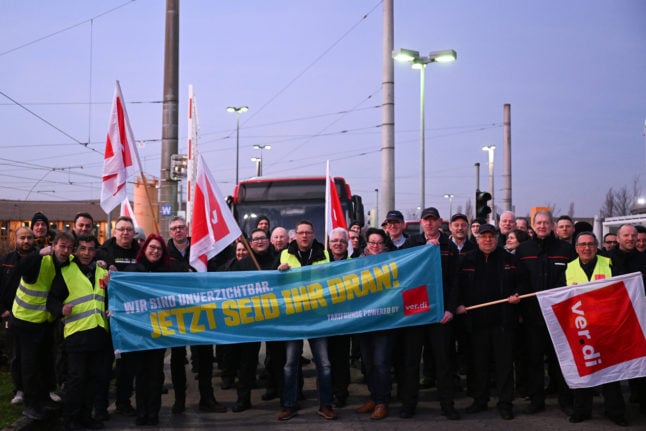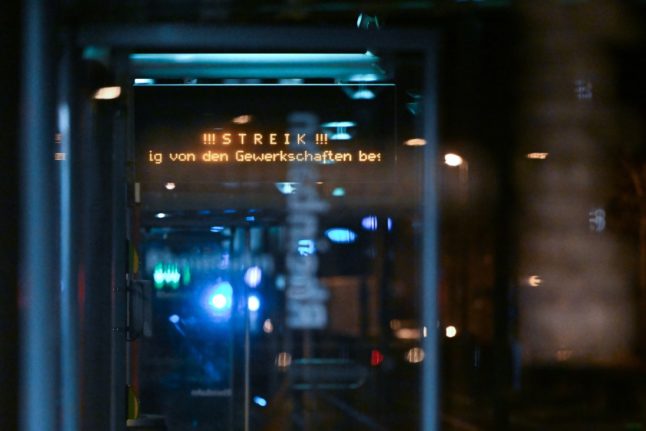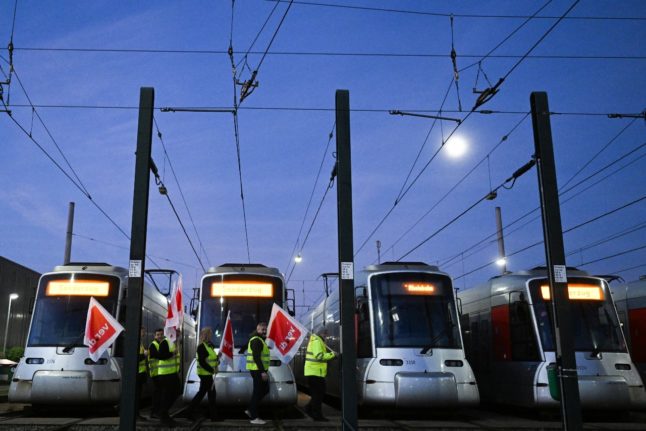What to know about the transport strikes in North Rhine-Westphalia

Numerous cities across Germany's most populous state were struck by transport strikes on Thursday, leaving commuters struggling to get to work. Here's what to know about the areas affected.
What's going on?
On Thursday, transport workers across North Rhine-Westphalia staged a walk-out as part of a wave of public sector strikes across Germany. Bus, train and tram services in the state were paralysed as commuters were forced to find alternative routes to work.
The strikes were called by the unions Verdi and DBB as a means of putting pressure on the government to improve wages and conditions for their employees. Specifically, Verdi is calling for a 10.5 percent hike in pay - or a minimum of €500 extra per month - to help workers bear the cost of high inflation.
They argue that the steep rise in the cost of energy and other everyday essentials has had a major impact on public sector workers and made it difficult for them to meet their living costs.
"Everything is getting more expensive: in the supermarket, at the petrol station, for heating costs," said DBB negotiating chief Volker Geyer at a rally in Aachen. "If you really value public service workers, you don't leave them alone with these worries - or else you shouldn't be surprised when the frustration about them is vented on the streets and in the workplaces."
With the industrial action set to last into Friday, people living in Germany's most populous state of North Rhine-Westphalia will have to navigate two days of limited public transport services - or plan to stay home where possible.
READ ALSO: Germany's train strikes: What rights do you have as a passenger?
Which areas are affected by the strikes?
Alongside major demonstrations in Dortmund, Cologne, Düsseldorf und Aachen on Thursday, several districts of NRW are affected by the public transport strikes:
Dortmund, Castrop-Rauxel, Lünen
From the start of operations on Thursday morning at 3:30am to the end of operations at approximately 1:30am on Friday, 1,800 employees of the Dortmund Stadtwerke (DSW21) will be on strike.
That means that all bus and light rail lines as well as certain other lines in Dortmund, Castrop-Rauxel, Lünen and Schwert will be cancelled. "The strike action will completely shut down local transport in Dortmund." says a press release from DSW21.
Only suburban and regional trains as well as the H-Bahn at the university and the airport shuttle will be running in Dortmund. Regional trains and S-Bahn lines in the DSW21 transport area are not affected by the strike.
In nearby Hagen and Oberhausen, there will also be warning strikes on local public transport.
Wuppertal, Remscheid, Solingen
Wuppertal's famous suspension railway (Schwebebahn) won't be running on Thursday, and bus services will also be cancelled due to the strike.
Public transport workers in Solingen and Remscheid are also joining the industrial action, and customer service centres at stations will also be closed throughout the day in all three cities.

Striking workers at a tram depot in Düsseldorf. Photo: picture alliance/dpa | Federico Gambarini
Düsseldorf
In Düsseldorf, the transport strikes are due to run for a full 48 hours from 3am on Thursday to 3am on Saturday.
Transport operator Rheinbahn has warned customers that U-Bahn trains and tram services will be cancelled entirely during this time, while very few buses will be in operation. School buses will also be out of action during the strike.
According to the transport company, customer service centres will be closed and the entire Rheinbahn service area will be affected, including the city of Düsseldorf, the district of Mettmann, the city of Meerbusch and the connections to Duisburg, Krefeld, Neuss and Ratingen.
People hoping to travel during this time should try to find alternative routes on S-Bahn and regional trains by consulting the local train infomation website, Rheinbahn said. A list of the bus services still running can also be found on the Rheinbahn website - though the routes may not be running to schedule.
They also warned customers that the mobility guarantee and connection guarantee for customers would be invalid on the days of strike.
READ ALSO: Why Germany could soon see widespread public sector strikes
Bielefeld
In Bielefeld, both the tram and bus timetables were "suspended" throughout the day on Thursday, according to DPA. Passengers were asked to find alternative means of transport.
Aachen and Cologne
Aachen and Cologne were unaffected by the transport strikes on Thursday, though public administrators did participate in the walk-out. That means that people living in those two cities could see limited refuse collections towards the end of the week.
As in other parts of North Rhine-Westphalia, nursery staff were also striking in Aachen and Cologne on Thursday. Several Kitas will remain closed throughout the day.

A sign at a Düsseldorf tram stop informs passengers of Thursday's strike action. Photo: picture alliance/dpa | Federico Gambarini
Are there likely to be more strikes?
That largely depends on the outcome of forthcoming negotiations between Verdi, civil servants' union DBB and local and central governments.
The second round of talks is set to take place in Potsdam on February 22nd and 23rd, with a third round of talks scheduled on March 27th and 29th.
If it looks like the two sides are unable to find a solution, there's likely to be even more disruption on local public transport and throughout the public sector in the coming weeks.
READ ALSO: Disruption expected as public sector workers around Germany go on strike
Why are so many strikes taking place right now?
As you might expect, the background to all of this is the steep rise in the cost of living.
According to the latest preliminary data from the Federal Statistics Office (Destatis), inflation stood at 8.7 percent in January - meaning the cost of everyday goods was, on average, 8.7 percent higher than it was a year ago.
This figure doesn't quite tell the whole story, though.
In fact, the price of essential products like heating and groceries has been rising even more steeply lately, forcing people to dig even deeper in their pockets to meet the cost of living.
 Transport workers walk around the tram depot in Düsseldorf on Thursday morning. Photo: picture alliance/dpa | Federico Gambarini
Transport workers walk around the tram depot in Düsseldorf on Thursday morning. Photo: picture alliance/dpa | Federico Gambarini
Against this backdrop, unions like Verdi have been fighting for pay increases that exceed or match the current rate of inflation.
However, not everyone agrees that this is a good strategy.
In fact, the European Central Bank (ECB) warned unions on Thursday to exercise restraint in their pay demands, arguing that big wage hikes could drive inflation even higher - a situation known as a wage-price spiral
Although workers were justified in seeking higher salaries to compensate for soaring consumer prices, "a wage-price spiral must be avoided", ECB vice-president Luis de Guindos said in an interview with the Süddeutsche Zeitung.
"Inflation will abate in the course of the year: we expect an average inflation rate of around six percent this year, with 3.6 percent in the last quarter.
"The trade unions may, however, be inclined to ask for excessive pay rises. We need to be careful."
Comments (1)
See Also
What's going on?
On Thursday, transport workers across North Rhine-Westphalia staged a walk-out as part of a wave of public sector strikes across Germany. Bus, train and tram services in the state were paralysed as commuters were forced to find alternative routes to work.
The strikes were called by the unions Verdi and DBB as a means of putting pressure on the government to improve wages and conditions for their employees. Specifically, Verdi is calling for a 10.5 percent hike in pay - or a minimum of €500 extra per month - to help workers bear the cost of high inflation.
They argue that the steep rise in the cost of energy and other everyday essentials has had a major impact on public sector workers and made it difficult for them to meet their living costs.
"Everything is getting more expensive: in the supermarket, at the petrol station, for heating costs," said DBB negotiating chief Volker Geyer at a rally in Aachen. "If you really value public service workers, you don't leave them alone with these worries - or else you shouldn't be surprised when the frustration about them is vented on the streets and in the workplaces."
With the industrial action set to last into Friday, people living in Germany's most populous state of North Rhine-Westphalia will have to navigate two days of limited public transport services - or plan to stay home where possible.
READ ALSO: Germany's train strikes: What rights do you have as a passenger?
Which areas are affected by the strikes?
Alongside major demonstrations in Dortmund, Cologne, Düsseldorf und Aachen on Thursday, several districts of NRW are affected by the public transport strikes:
Dortmund, Castrop-Rauxel, Lünen
From the start of operations on Thursday morning at 3:30am to the end of operations at approximately 1:30am on Friday, 1,800 employees of the Dortmund Stadtwerke (DSW21) will be on strike.
That means that all bus and light rail lines as well as certain other lines in Dortmund, Castrop-Rauxel, Lünen and Schwert will be cancelled. "The strike action will completely shut down local transport in Dortmund." says a press release from DSW21.
Only suburban and regional trains as well as the H-Bahn at the university and the airport shuttle will be running in Dortmund. Regional trains and S-Bahn lines in the DSW21 transport area are not affected by the strike.
In nearby Hagen and Oberhausen, there will also be warning strikes on local public transport.
Wuppertal, Remscheid, Solingen
Wuppertal's famous suspension railway (Schwebebahn) won't be running on Thursday, and bus services will also be cancelled due to the strike.
Public transport workers in Solingen and Remscheid are also joining the industrial action, and customer service centres at stations will also be closed throughout the day in all three cities.

Düsseldorf
In Düsseldorf, the transport strikes are due to run for a full 48 hours from 3am on Thursday to 3am on Saturday.
Transport operator Rheinbahn has warned customers that U-Bahn trains and tram services will be cancelled entirely during this time, while very few buses will be in operation. School buses will also be out of action during the strike.
According to the transport company, customer service centres will be closed and the entire Rheinbahn service area will be affected, including the city of Düsseldorf, the district of Mettmann, the city of Meerbusch and the connections to Duisburg, Krefeld, Neuss and Ratingen.
People hoping to travel during this time should try to find alternative routes on S-Bahn and regional trains by consulting the local train infomation website, Rheinbahn said. A list of the bus services still running can also be found on the Rheinbahn website - though the routes may not be running to schedule.
They also warned customers that the mobility guarantee and connection guarantee for customers would be invalid on the days of strike.
READ ALSO: Why Germany could soon see widespread public sector strikes
Bielefeld
In Bielefeld, both the tram and bus timetables were "suspended" throughout the day on Thursday, according to DPA. Passengers were asked to find alternative means of transport.
Aachen and Cologne
Aachen and Cologne were unaffected by the transport strikes on Thursday, though public administrators did participate in the walk-out. That means that people living in those two cities could see limited refuse collections towards the end of the week.
As in other parts of North Rhine-Westphalia, nursery staff were also striking in Aachen and Cologne on Thursday. Several Kitas will remain closed throughout the day.

Are there likely to be more strikes?
That largely depends on the outcome of forthcoming negotiations between Verdi, civil servants' union DBB and local and central governments.
The second round of talks is set to take place in Potsdam on February 22nd and 23rd, with a third round of talks scheduled on March 27th and 29th.
If it looks like the two sides are unable to find a solution, there's likely to be even more disruption on local public transport and throughout the public sector in the coming weeks.
READ ALSO: Disruption expected as public sector workers around Germany go on strike
Why are so many strikes taking place right now?
As you might expect, the background to all of this is the steep rise in the cost of living.
According to the latest preliminary data from the Federal Statistics Office (Destatis), inflation stood at 8.7 percent in January - meaning the cost of everyday goods was, on average, 8.7 percent higher than it was a year ago.
This figure doesn't quite tell the whole story, though.
In fact, the price of essential products like heating and groceries has been rising even more steeply lately, forcing people to dig even deeper in their pockets to meet the cost of living.

Against this backdrop, unions like Verdi have been fighting for pay increases that exceed or match the current rate of inflation.
However, not everyone agrees that this is a good strategy.
In fact, the European Central Bank (ECB) warned unions on Thursday to exercise restraint in their pay demands, arguing that big wage hikes could drive inflation even higher - a situation known as a wage-price spiral
Although workers were justified in seeking higher salaries to compensate for soaring consumer prices, "a wage-price spiral must be avoided", ECB vice-president Luis de Guindos said in an interview with the Süddeutsche Zeitung.
"Inflation will abate in the course of the year: we expect an average inflation rate of around six percent this year, with 3.6 percent in the last quarter.
"The trade unions may, however, be inclined to ask for excessive pay rises. We need to be careful."
Join the conversation in our comments section below. Share your own views and experience and if you have a question or suggestion for our journalists then email us at [email protected].
Please keep comments civil, constructive and on topic – and make sure to read our terms of use before getting involved.
Please log in here to leave a comment.